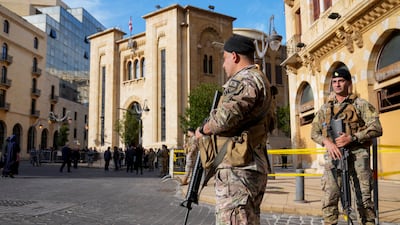Lebanon’s government Eurobonds are surging on the election of a new president and on optimism that reforms would be undertaken in the war ravaged country.
The country's parliament elected army chief Gen Joseph Aoun as president on Thursday, ending a power vacuum that had persisted since 2022 and marking a significant political milestone ahead of crucial developments, including the fate of a ceasefire with Israel and the start of postwar reconstruction efforts.
Gen Aoun secured 99 votes in the second round of voting to clinch the presidency. In the first session, he gathered 71 out of the 86 votes needed in the 128-member house.
“The strong rally in Lebanon's government Eurobonds stems from the optimism that the election of Joseph Aoun as the next President, would lead to the implementation of much-needed deep institutional and structural reforms, and a national anti-corruption drive,” Nasser Saidi, a former economy minister and deputy governor of Lebanon's central bank, told The National.
The rally, however, is expected to “be short-lived", and will depend on the choice of an effective prime minister and government formation at an early date, he added.
Under Lebanon's power-sharing system, the presidency is reserved for a Maronite Christian, the role of prime minister for a Sunni Muslim and parliamentary speaker for a Shiite Muslim.
“The need for Lebanon is to have a strong-willed PM and cohesive, competent, and effective government willing to undertake structural reforms without bowing to political pressure. Concurrently, there needs to be a permanent ceasefire in the South to help stabilise the country,” Mr Saidi said.
In November, Israel and Lebanon reached a two-month ceasefire agreement to end the devastating conflict with Hezbollah, after more than a year of cross-border clashes escalated into full-scale war just three months before the deal was struck between the two sides.
Lebanon's economy struggled after the government defaulted on about $31 billion of Eurobonds in March 2020, with its currency sinking more than 90 per cent against the dollar on the black market.
It has yet to enforce critical structural and financial reforms required to unlock $3 billion of assistance from the International Monetary Fund, as well as billions in aid from other international donors.
The conflict with Israel led to further deterioration of its economy, with physical damages and economic losses due to the conflict estimated at $8.5 billion, according to a World Bank report in November. Damage to physical structures alone amounts to $3.4 billion and economic losses have reached $5.1 billion.
Lebanon bonds are currently priced at 15.20 cents to the dollar and have rallied since late September on the back of weakening of Hezbollah following the killing of its leader Hassan Nasrallah in an Israeli airstrike.

“The bonds’ prices reached a low of 6.25 cents to the dollar in the fourth quarter of 2022, and picked up gradually since last October to reach 13 cents to the dollar yesterday on the secondary market. But prices are still way below the Eurobond prices of other sovereigns that defaulted on their obligations in 2022, two years after Lebanon’s default,” said Nassib Ghobril, chief economist at Beirut-based Byblos Bank.
He gave examples of Sri Lanka, Ethiopia and Ghana whose bonds performed much better than Lebanon at about 62 cents to the dollar, about 78 cents to the dollar and Ghana at a range of 43 to 70 cents.
“Therefore, the “rally” of Lebanese Eurobonds needs to be put in perspective. It comes from a record low price and has been driven by speculation until last week. But concrete political developments, like the election of a president today and the quick formation of a reform-minded government will support prices to a certain extent going forward,” Mr Ghobril said.
Other analysts also sounded bullish about the election of a new President as Lebanon continues to grapple with economic crisis.
“His presidency could potentially facilitate international aid and support, particularly from the US, EU, and Gulf states, which is crucial for Lebanon's economic recovery,” Joseph Dahrieh, managing principal at Tickmill brokerage company, said.
“However, significant challenges remain, including the country's massive debt burden, endemic corruption, and need for structural reforms. Any meaningful recovery in Eurobond values would require implementing comprehensive economic reforms and restoring creditor confidence
The election of a president after twelve failed attempts in the last two years is a good start to help the economy move forward, according to Hasnain Malik, emerging and frontier markets equity strategy at Tellimer.
“From such a distressed level in the pricing of Lebanon's Eurobonds, even a slight improvement in the probability of an upside scenario can have an outsized impact,” Mr Malik said.
There is also an urgent need for Lebanon to undertake reforms including effective governance, transparency and accountability to help the economy grow, according to analysts.
In May, an IMF delegation visited Lebanon and concluded that the lack of action on necessary economic reforms continues to exert a heavy toll on Lebanon’s economy and population.
“The right governance set-up and transparency is vital for Lebanon's next step towards reform implementation,” Mr Saidi said. “Reforms will need to range from restructuring the banking and financial sector, restructuring external debt, in addition to reforms including fiscal consolidation and reform, downsizing of the public sector, effective management and governance of the state-owned enterprises, in addition to creating a credible, transparent monetary and exchange rate system [including the move to a flexible exchange rate regime].”
Lebanon will also have to negotiate a new agreement with the IMF as the political, economic, banking, and financial landscape has changed dramatically since the previous IMF staff level agreement in 2020, he added.


